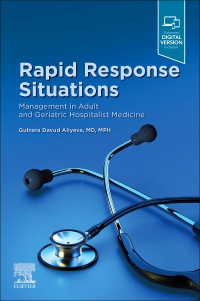
Rapid Response Situations, 1st Edition
Paperback

Now $59.51
-
-
Addresses the most common rapid response situations in a brief, highly templated, and bulleted format designed for quick reference at the point of care.
-
Step-by-step coverage includes:
-
Which stabilization measures to implement
-
Which tests to order and why
-
Which medications to administer, including dosage
-
Which specialists to consult for further interventions
-
A must-have reference for hospitalists, intensivists, ICU nurses, and other rapid response team members, including those working in rural settings with few intensivists or specialists available for consults.
-
Enhanced eBook version included with purchase. Your enhanced eBook allows you to access all of the text, figures, and references from the book on a variety of devices.
-
-
Introduction
1 Cardiac Emergencies
Syncope
Acute decompensated heart failure
Acute coronary syndrome
Cardiogenic shock
Atrial fibrillation with rapid ventricular response
Hypertensive emergency with encephalopathy
Hypertensive emergency with hemorrhagic stroke
Hypertensive emergency with acute aortic dissection
Acute pericarditis
Acute cardiac tamponade
2 Respiratory Emergencies
Acute asthma exacerbation/status asthmaticus
Chronic obstructive pulmonary disease (COPD) exacerbation
Aspiration pneumonitis
Life-Threatening hemoptysis
ARDS (Acute respiratory distress syndrome)
Massive pulmonary embolism
Severe acute atelectasis
Spontaneous pneumothorax
Tension pneumothorax
Acute hypercapnic respiratory failure due to oversedation
Acute partial upper airway obstruction
Acute complete upper airway obstruction
Idiopathic pulmonary fibrosis exacerbation
Acute pulmonary arterial hypertension
Anaphylaxis
Acute nonhistaminergic angioedema
3 Neurological Emergencies
Seizure/status epilepticus
Acute ischemic stroke
Acute hemorrhagic stroke
Acute intracranial pressure
Delirium/agitation in intensive care unit/hospital wards
Myasthenic crisis
Guillain-Barre syndrome
Serotonin syndrome
Neuroleptic malignant syndrome
4 Gastrointestinal Emergencies
Upper gastrointestinal bleeding
Lower gastrointestinal bleeding
Acute liver failure
Severe acute pancreatitis
Acute ischemic colitis
Acute mesenteric ischemia
5 Endocrine Emergencies
Severe diabetic ketoacidosis
Hyperosmolar hyperglycemic state
Hyperthyroidism/Thyroid storm
Hypothyroidism/Myxedema coma
Acute adrenal (Addisonian) crisis
Hypercalcemic crisis
Hypocalcemic crisis
Acute severe hypernatremia
Acute severe hyponatremia
Acute severe hyperkalemia
Acute severe hypokalemia
6 Hematologic Emergencies
Acute blood transfusion reaction – febrile nonhemolytic reaction
Urticarial allergic reaction
Acute blood transfusion reaction – transfusion associated circulatory overload (TACO)
Acute blood transfusion reaction – transfusion related acute lung injury (TRALI)
Acute blood transfusion reaction – anaphylactic reaction
Acute blood transfusion reaction – acute hemolytic reaction
Acute heparin induced thrombocytopenia
Disseminated intravascular coagulation
Acute chest syndrome in sickle cell diseases
Acute immune thrombocytopenia (ITP)
Thrombotic thrombocytopenic purpura (TTP)
Atypical hemolytic uremic syndrome (HUS)
7 Oncologic EmergenciesTumor lysis syndrome
Severe hypercalcemia of malignancy
Syndrome of inappropriate antidiuretic hormone secretion (SIADH)
Febrile neutropenia
Acute hyperviscosity syndrome
Superior vena cava syndrome
Malignant epidural spinal cord compression
Rapidly accumulating pericardial effusion
8 Infectious Disease Emergencies
Sepsis and septic shock
Acute hypoxemic respiratory failure due to severe pneumonia
Hypovolemic shock due to acute infectious diarrheal illness
Acute respiratory failure due to Influenza virus infection
Acute respiratory failure due to COVID-19 (coronavirus disease of 2019) pneumonia
9 Management of Postprocedural Complications in Hospitalized Patients
Tracheostomy basics
Short-term tracheostomy complication (<7 days): accidental dislodgement/decannulation (removal) of the tracheostomy tube
Short-term tracheostomy complication (<7 days): tracheostomy site hemorrhage
Long-term tracheostomy complication (>7 days): blockage of the tracheostomy tube
Long-term tracheostomy complication (> 7 days): accidental dislodgement/decannulation (removal) of the tracheostomy tube
Long-term tracheostomy complication (> 7 days): tracheoesophageal fistula
Long-term tracheostomy complication (> 7 days): tracheoinnominate fistula
Cardiac catheterization complication: hematoma at the access site at common femoral artery
Cardiac catheterization complication: retroperitoneal hematoma
Cardiac catheterization complication: contrast-induced nephropathy
Cardiac catheterization complication: pseudoaneurysm, arteriovenous fistula and femoral artery occlusion
Cardiac catheterization complication: anaphylactoid reactions
Complication of paracentesis: paracentesis-induced circulatory dysfunction
Complication of paracentesis: persistent leakage of ascitic fluid from puncture site
Complication of paracentesis: hemorrhage
Complication of paracentesis: visceral perforation (bladder, stomach, bowel)
Complications of thoracentesis: pneumothorax
Complication of thoracentesis: hemothorax
Complication of thoracentesis: infection/empyema
Complication of thoracentesis: liver/spleen injury
Complication of lumbar puncture: post-LP headache
Complication of lumbar puncture: spinal hematoma
Complication of lumbar puncture: cerebral herniation
10 Rapid Response Cases
Case I
Case II
Case III
Case IV
Case V

 as described in our
as described in our 